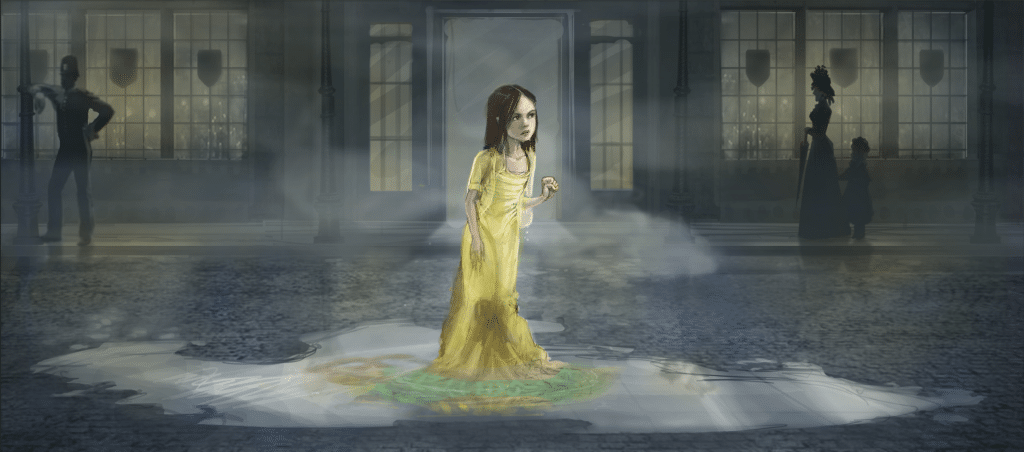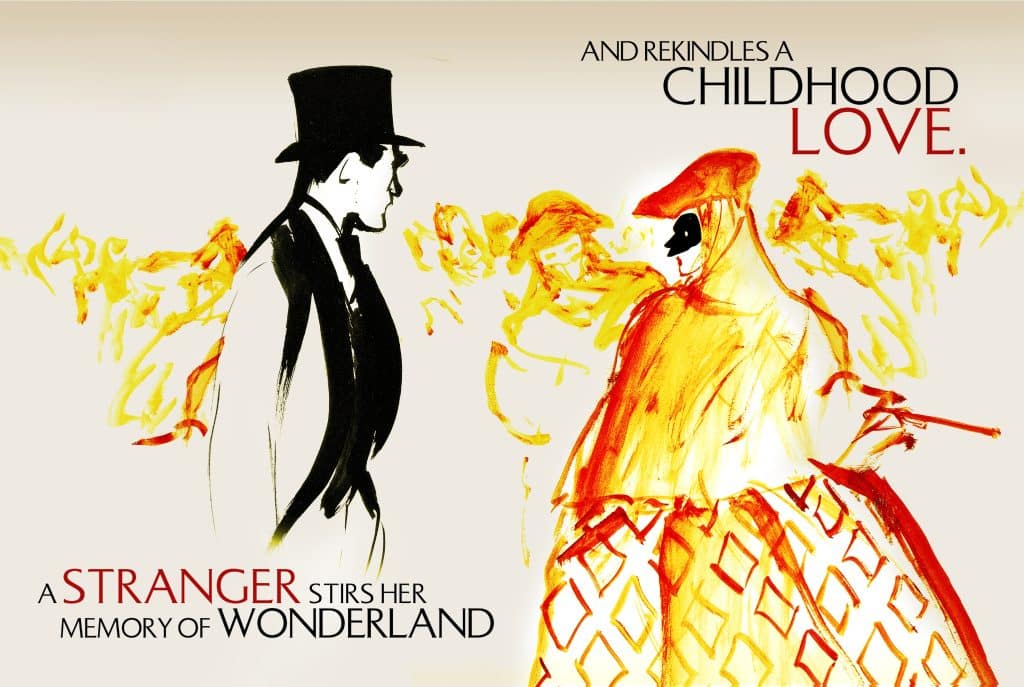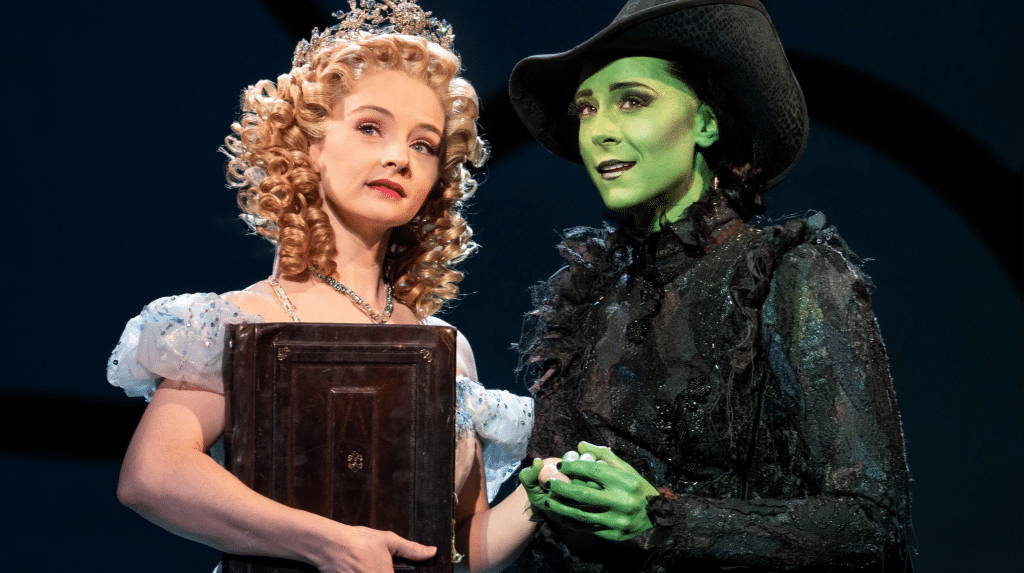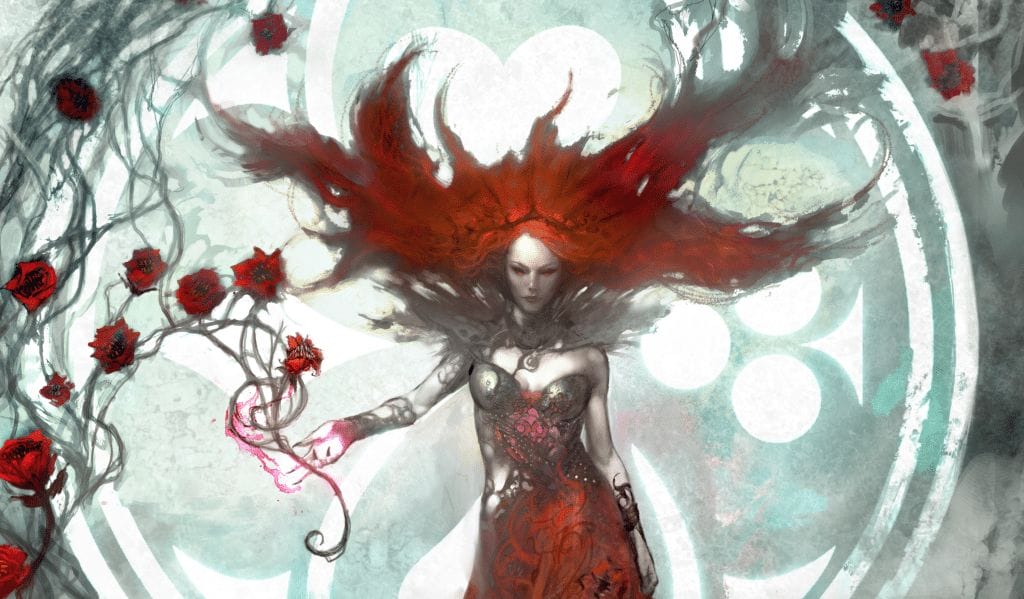As an amateur scholar and die-hard enthusiast of everything to do with Alice in Wonderland, I have launched a podcast that takes on Alice’s everlasting influence on pop culture. As an author who draws on Lewis Carroll’s iconic masterpiece for my Looking Glass Wars universe, I’m well acquainted with the process of dipping into Wonderland for inspiration.
The journey has brought me into contact with a fantastic community of artists and creators from all walks of life—and this podcast will be the platform where we come together to answer the fascinating question: “What is it about Alice?”
For this episode, it was my great pleasure to have Teresa Lin join me as my guest on this episode! Read on to explore our conversation and check out the whole series on your favorite podcasting platform to listen to the full interview.

Frank Beddor
Hey, everybody, welcome to the show. This week, I am sitting right across from my new guest and I'm a little bit nervous, I have to do a really good job today. I have to be very cautious about the questions I ask and I have to leave a lot of space for her to answer. Not only is she a brilliant writer and a creative force to be reckoned with, she's somebody I married five months ago. I'd like to welcome my wife and my collaborator, Teresa Lin, to the show.
We're gonna be talking about The Looking Glass Wars and some of the work that we've collaborated on such as the TV show and the movie. We’ll also talk about the musical because that's how we started our creative collaboration, with her helping solve a problem that I could not solve. So it's always nice to have somebody much smarter and better looking. And probably a lot more articulate. So welcome to the show, Teresa Lin.
Teresa Lin
Thank you. It's nice to be here. It's kind of interesting to be sitting across from you and having this spatial and auditory distance. It feels like our collaboration has always come from this inside space where we're really deeply connected.
FB
I’ll reach out and hold your hand if you get nervous. I can be intimidating to guests at times with very probing questions.
But it’s important that we start with your creative background. I mean, you can go back as far as you'd like. But I'm interested in the evolution from your time in Taiwan to the States to Duke to USC film school, to starting in the film and TV business to getting one of your first jobs as a professional writer on the TV show Bones.

TL
One of the ways that I like to contextualize how I came to storytelling has always been this imaginative space, this expanse, that I filled because I had no access to television growing up in Taiwan and I was kind of a solo kid with both parents working. I was brought up really by the school teachers the school principal and myself. I was given a set of art supplies and some books and I was left to myself. So that expansive creativity, imagination, and filling in started there. I remember the very first film I saw, my grandmother took me to Snow White. What I remembered was the magic of cinema and also the model of what girls should grow up to be. Being in Taiwan it was the Chinese culture where girls were taught to be quiet and subservient. The quiet and small spaces that I had to fill I did with my imagination and stories.
So when I came to Florida, my family bought into a motel where we worked and lived. That was my bird's eye view into American culture. I was quite enamored with what America stood for and then quite startled by the reality of what it looked and felt like living in a motel next door to Baxter's Lounge, which was a transvestite bar in a not-so-great part of Tampa. Again the discrepancy between what was imagined and what was sold to me, and what the reality gave me more fodder for creating stories.
Then all the life experiences I had growing up with my parents giving me this cultural background of what it means to be Chinese and Taiwanese and keeping those ethics and then the idea of higher education being the number one driving force in my life and understanding that if I were educated, then that would be my ticket up in society. That gave me a tremendous work ethic and it landed me at Duke, and then at USC film school, but people are always surprised when I tell them that I didn't really find cinema or was able to watch movies until I was in college.
I remember the book that did it for me was The Godfather by Mario Puzo, and how much it drew me in and how this Italian culture of family was so similar it was to my culture. Then watching the movie, I had this totally internal and external experience of someone else's interpretation of that book. I thought, “Oh, my God, this is a thing.” Ever since then, I was just driven by the idea of film and story. People say that films are immediate empathy machines. So when someone is watching it they're breadcrumbed into the feeling and experience of these characters. For me, someone who's come from the outside and really wants to be on the inside, language and storytelling were a way to draw people in.
FB
I'm curious about the differences you remember between the book and the experience with the movie and if you had any critique at the time. Or did they each stand on their own two feet and you just marveled that the story worked as a novel and worked as a film?

TL
It was the sensation at times of deja vu because it was so similar to what I had imagined. Then, at times, it was really different because of casting, or I didn't see or experience the character in such a tone. Nevertheless, it was a depiction of family and the tension between the characters, the family, and the conflict that was so prescriptive of what family hierarchy looked like. Because as a child, you felt the reverberation of the adults making the very important decisions. My family had gone through a lot of drama because of the motel and because of us being immigrants. There was a lot of misunderstanding between what we were feeling and the conflict that's out there, and the fear of the unknown, and not knowing how to control it.
Also, I was the first person in my family to really study English. My mom took some English classes where she worked, but I was the oldest of three daughters and I was the first one in my family to really get a grasp of English so I became sort of the translator. I was translating a lot of legal documents or I was running the front desk of this motel and talking to adults and negotiating prices. So it was me engaging with this adult world and trying to translate that to my parents.
FB
Were you a teenager or younger when you were doing this?
TL
I started around nine or 10. The importance of understanding and having a grasp of the language was paramount to the role that I played for my family. What I took away from that was if I could be understood, then people could be on my side, because understanding is a precursor to love and acceptance. So, for me, language was the key. Knowing how to tell a story well and contextualize it for the other person is the key to being understood.
FB
So story has been a big part of your life, but you were also thinking about becoming a lawyer. In law, there's performance, there’s story, but there's also interpretation and the ability to absorb a lot of information and then retell the story the way you want to present it.
TL
As with a lot of immigrant families, you understand that the sacrifices they made mean that you are either going to become a doctor or a lawyer, or something of the like. Translating legal documents was already part of my repertoire, I was on the debate team, and I was a member of the Association for Young Lawyers Club.
But to your point, playing with words and digesting words, understanding how they will fit and how to contextualize someone's subjective narrative, and understanding what the greater purpose is for writing something or for telling a story has always been a muscle that's been well-honed in my life.

FB
So we've been married for five months, but a couple for a decade, which has a nice ring to it. Why don't you tell the audience about your first encounter with Alice in Wonderland?
TL
I would say that Alice in Wonderland came to me through Disney. I watched the Disney film when I was probably 11 or 12. It’s a little blonde girl who falls down a rabbit hole and has a lot of nonsensical events happen to her. It tickles everybody to think of, “What if I’m in this dream place where nothing seems to make sense?”
It frees you from logic and it allows you to be playful. Though I remember it getting pretty dark with the Queen of Hearts. Then it just was resolved by it all being a dream. I don't think I connected to Alice as much as I did to some other Disney characters because I think this idea of staying a child and not wanting to grow up was exactly the opposite of what I was conditioned to do.
FB
You finished high school early. You finished Duke early. You wanted to get into your adulthood, into your career, and what ultimately became writing for television.
TL
The path of writing for television showed itself down the road. But I was always fascinated by storytelling. I used to live in the library as a kid and I used to go into the research section and look up all the ways that fairy tales evolved from Europe and all the different origin stories coming from all different cultures and how they evolved and how they came into our consciousness.
I was just fascinated with it. I'm not quite sure why but I was very interested because, as a child, a lot of the Chinese lore and mythology tales were told to us as cautionary tales. They were ways that our lessons came to us. If we, as kids, didn't do the right thing, then these are the consequences. I needed to understand that. I was raised partly Buddhist, but also, these stories conveyed to us, “If you tell lies, something bad is going to happen to you. I think as a kid, or as a person, you want to examine what is the worst thing that can happen to you.
FB
For me, it's the devil and hell.
TL
That’s right, being burned forever. But now looking at the larger lens of stories and Alice, I wanted to revisit that because I remember when I first met you, I was learning and reading about The Looking Glass Wars, and how you reimagined Alice. It was really inspiring because you were empowering a girl to become a warrior queen and, more importantly for me, it was somebody who had to look back and reconcile the history of her past, and not just her own past but her family's past as well. That’s something I really recognized within my own history.

FB
This is a motif that you're deeply invested in, your past, and using it in storytelling.
TL
A lot of the impetus for my writing has to do with how we tell our stories and how it forms our identity. In order to move on we need to reconcile and contextualize our past, not just for ourselves, but for our ancestors. There are generational traumas that need to be reconciled for us to understand how to move on and pass that on to our daughters and sons. We as a species need stories to help us understand and give value and meaning to everything we've gone through outside of just our immediate emotional responses.
FB
We had been a couple for two or three years, and you had your focus on the things that you were doing and I had the things that I was working on, and, of course, we talked about The Looking Glass Wars, but we weren't collaborating yet.
TL
I remember you diving back into developing the musical.
FB
We went for a walk in Minnesota around Christmas Lake, where I grew up, and I was lamenting this problem with adapting The Looking Glass Wars into a musical and I was stuck. I was trying to shoehorn this novel that I've lived with for all these years into a musical. I had been inspired by Wicked and I really thought it could work.
TL
You were having a hard time reconciling Alyss with two love interests.

FB
They were separated and half of the show was with Prince Leopold and then half of it was back with Dodge and I said, “That's never going to work and I don't know how to fix it.” So we kept walking and you didn't say anything for a little bit but then you just turned and went “I think if they're the same character that would work.” If Prince Leopold is, in fact, also Dodge and Dodge is Prince Leopold so they’ll go back and forth between our world and Wonderland. I was in love with you before that, but that moment was, “Wow!” I think I grabbed your hand, “I’m not ever letting go.”
TL
I thought that moment happened when I hit that ball…
FB
That's true. We went on a little vacation and I was teaching you how to putt on a golf course. It was about a 60-foot downhill-breaking putt and you sank it.
TL
I think that was the first moment.
FB
That was the athletic moment because I live in two spaces. I live in the athletic space and I live in the creative space. So that was more of my past coming through.
TL
That was really fun. I do remember the moment you're talking about around Christmas Lake, when you looked at me with new eyes, “You and I can collaborate.”
FB
We talked about a lot of different musicals and you started writing the outline for what they call the book, which is the outline for the composer and the lyricist. Those are really tricky.
TL
It was really fun because there's another aspect of my childhood that Frank didn't know about and working on this project with him allowed me to plumb into this past where I had music in my life. Growing up, we didn't have a television but we had a piano and we always played and sang. So musicality was always a part of our family life so when I was invited in to work on this musical, I really had fun.

FB
You love to dance as well. You're quite the dancer. But the tricky thing was sorting out the tone. We were looking at Les Miserables as an example, for a bit, and we were obviously also looking at Wicked. Moulin Rouge as well.
TL
We were looking at these great, sweeping love stories because ultimately, it's a big love story that drives it. But we also wanted to make it fresh. We wanted to look at examples of taking something that we all know, in popular culture, and taking a left turn with that project. It’s reimagining and reinventing something that feels familiar and giving it a twist.
FB
Musically, you had a lot of various songs. You usually put a reference song or two for each scene. That was the roadmap of what we were thinking for future composers and lyricists.
TL
Given the time and the space to do a deep dive, it flows. There’s so much material there to draw from.
FB
I think the aspect of being able to establish the reimagining of what happened with Lewis Carroll, but ultimately, having it be driven by this love story, and her coming back home and to her destined love.
TL
And her finding her sense of identity.
FB
That’s been really enjoyable. One of the challenges that we both have in terms of finding the entry point for The Looking Glass Wars, beyond the books and graphic novels, is what's the right medium. What's the timing and what's the best story? Just in the same way that a movie has really limited parameters and time, for a musical you have 20 songs and you have to compress and condense. I've found that to be very difficult because maybe I'm too close to this source material but when we started talking about it as a TV show it started to show itself as a really exciting avenue.

TL
I really enjoy watching stories now where the characters are tied together not through chronology or space and time but thematically. So the characters don't necessarily have to be in the same space to share something really meaningful. I love the way that sometimes storylines cut across each other. Maybe there's a pivotal scene or an emotional scene where the emotions connect the characters. So we're really able to explore that in the TV show model because of the magic system and the emotionality that ties Hatter and Alice together, and also explores Queen Redd, and some of the reasons why she became Redd in her timeline as a teenager with her sister. I really want to ground it in the family story.
I know the scope of the show is huge. There's a whole Wonderverse out there that you've created over 20 years with so many nations, characters, and really cool concepts. But underneath it all, it's a family story. For me, it's the Hart family and what happened back in the day with Genevieve and Redd when things got out of balance and how their ability to wield imagination ripples out to the rest of the world. For Alice, it's a redemption story for her family and it’s a redemption story for herself and in the decision of who she wants to be going forward.
FB
I'm really glad I married you. Bringing it full circle to your family, The Godfather, and The Looking Glass Wars, finding that strong theme of family and anchoring it in that is something that I would like to continue to explore with you in these podcasts.
TL
I would love to come back and share our process.
FB
It’s really nice to chat with you across the table and to expand our collaboration in this way.
TL
All right till next time.
For the latest updates & news about All Things Alice, please read our blog and subscribe to our podcast!